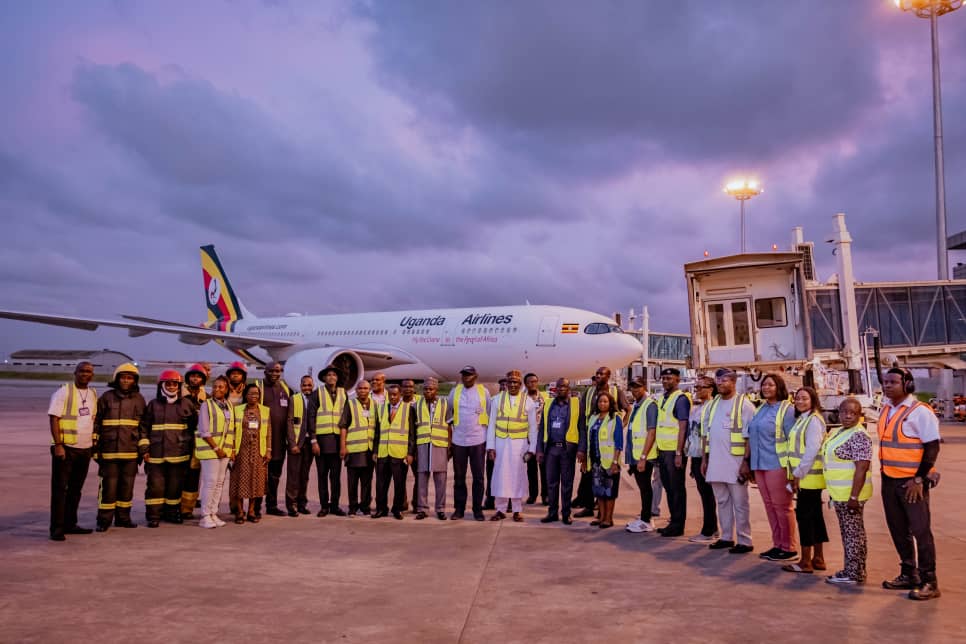21 years after air pact, Nigeria, Uganda flights begin
In a bid to connect West Africa to eastern Africa, Uganda Airlines Friday commenced flight operations to Nigeria through the Murtala Muhammed International Airport (MMIA), Lagos. This was coming 21 years after both countries signed the Bilateral Air Service Agreement (BASA) for flight operations. The inaugural flight of the airline touched down at the MMIA […]

In a bid to connect West Africa to eastern Africa, Uganda Airlines Friday commenced flight operations to Nigeria through the Murtala Muhammed International Airport (MMIA), Lagos.
This was coming 21 years after both countries signed the Bilateral Air Service Agreement (BASA) for flight operations.
The inaugural flight of the airline touched down at the MMIA from Entebbe International Airport with passengers and a government delegation.
The A330-800 aircraft was received with a ceremonial water cannon salute from the Federal Airports Authority of Nigeria (FAAN) Firefighting and Rescue Services. And just as the airline commenced the three weekly flights to Lagos, the federal government has granted approval for it to operate to Abuja and Kano airports in line with the Single Africa Air Transport Market (SAATM).
- Insecurity: How military camp forced children out of school in Katsina community
- Wrongly evacuated to Nigeria at 5; the 9-year travails of a Cameroonian boy
Stakeholders said the new flight operation would not only reduce air fares but ease connectivity for passengers connecting Europe, Middle East and Asia from West and East Africa. Uganda Airlines’ chief executive officer, Jenifer Bamuturaki, disclosed that the flight from Entebbe to Lagos took about three and half hours.
“That means if you are flying to Mumbai or Dubai, you don’t have to go 10 hours across directions, you just come to Entebbe three and a half hours and you are in Dubai for another four and a half hours,” she said.
The Minister of Aviation and Aerospace Development, Mr Festus Keyamo, said the airline was granted two additional designations in the spirit of African Open Skies policy.
Keyamo, who was represented by the Director of Transport Management in the ministry, Mr Hassan Ejibunu, said the approval would deepen the Nigeria-Uganda connectivity, in addition to connecting passengers of both regions.
Keyamo added: “The journey started on October 9, 2002 in Kampala, Uganda when the two respective ministers of both countries responsible for Civil Aviation initiated an Air Services Agreement (ASA) with the ultimate desire of bringing about a direct flight from Entebbe, Uganda to Ikeja, Lagos.
“This was further reviewed in January, 2015 with certain provisions. It was a matter of concern that the ASA was never operationalised until today, with Uganda utilising the designated airline from her side to commence the flight operations. Kudos must go to the management of the airline and the government and people of Uganda under the leadership of President Yoweri Museveni for this great feat.
“I would like at this juncture state that aviation remains the best way for Africa to connect her people and promote inter-Africa business in line with Africa’s 2063 Agenda, as championed by our leaders. This is the line being followed by Uganda Airlines through her collaboration with the Uganda High Commission in Nigeria in organising a one-day Trade and Business Forum taking place in Lagos.
“I will urge the Business Groups of both countries to latch on the opportunities to make the Nigeria-Uganda route, one of the preferred routes in Africa for trade, investment and tourism.”
Uganda’s High Commissioner to Nigeria, Amb. Nelson Ocheger, stressed the importance of air transportation in Africa’s growth, urging African nations to leverage the Single Africa Air Transport Market (SAATM) to achieve the 2065 Africa Agenda.
He said efforts were also underway to promote technical cooperation and collaboration between aviation institutions in Uganda and Nigeria.
“The importance of air transport underscores the promotion of trade and investment and it gives Africa the opportunity to leverage on all AU agenda. We thank the Nigerian government for the necessary approval needed to do this operation,” he added.
Nigeria’s Minister of Foreign Affairs, Ambassador Yusuf Tuggar represented by Director of Airport Protocol in the Ministry, Ambassador Oludare Folowosele said, this move is aimed to reduce the need for European connections when traveling between African countries.
“It is ridiculous to go to Europe before connecting two African neighbouring countries. What we are doing today would lead to wealth creation, shortening of travel time from one country to another rather than depend on Europe all the time for flight connections.”
